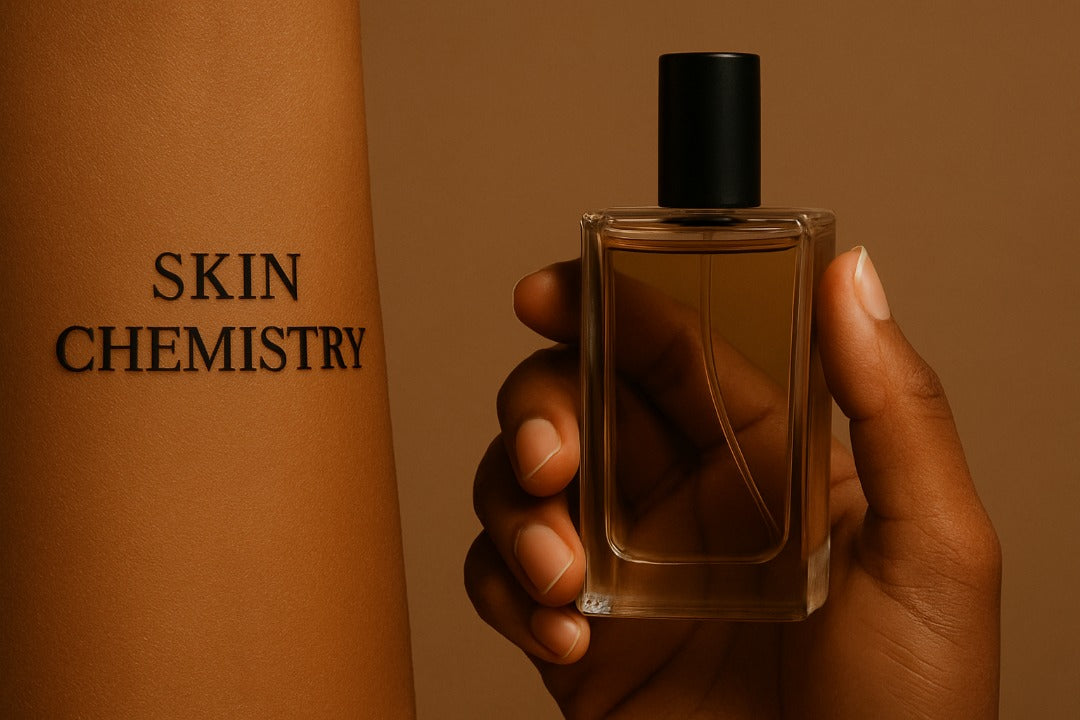
How Skin Chemistry Affects Fragrance
Share
When it comes to perfume, one size does not fit all. You've probably noticed that a fragrance smells different on your skin than it does in the bottle or on someone else. This is due to the concept of skin chemistry, a crucial factor in how fragrances develop and interact with your body. In this blog post, we explore how skin chemistry and perfume work together to create a personalized scent experience.
What is Skin Chemistry?
Skin chemistry refers to the unique combination of factors that make your skin react to perfume in its own way. These factors include your skin type, pH level, body temperature, and even your diet and hormones. The interaction between perfume and skin chemistry plays a huge role in fragrance longevity and how perfume notes evolve throughout the day.
Why Do Perfumes Smell Different on Skin?
When you apply perfume, its fragrance compounds are absorbed into the skin, where they mix with your body’s natural oils. This can either amplify or change the fragrance, which is why perfume notes and skin chemistry are so important. For example, a fragrance that is citrusy or floral on one person may turn warmer or spicier on another due to the differences in skin chemistry.
Some people have more acidic skin, while others have more neutral or alkaline skin. These differences can affect how certain notes in the perfume—like citrus, vanilla, or amber—react, resulting in a slightly different scent profile.
How Skin Type Affects Fragrance
Another factor that influences how perfume interacts with skin is your skin type. Those with oily skin tend to experience longer-lasting fragrances because the oils on their skin help "hold" the scent. On the other hand, individuals with dry skin may find that fragrances fade quicker as their skin doesn’t retain the scent as well. Best perfumes for skin chemistry might therefore vary depending on whether your skin is oily, dry, or somewhere in between.
Hormones, Diet, and Body Temperature: The Hidden Influencers
Other than skin type, hormones, body temperature, and even diet can affect how a fragrance develops on your skin. For example, during times of hormonal fluctuations, such as pregnancy or menopause, you may notice that your usual scent smells different. Fragrance development and skin also vary with body temperature; warmer skin tends to amplify scents, while cooler skin can make them feel more subtle.
The Role of Perfume Layers in Skin Chemistry
Each perfume is made up of top, middle, and base notes. The way these notes unfold on your skin can be influenced by your skin chemistry. The top notes are the first impressions, but they dissipate quickly. The middle notes, or heart notes, are more balanced and last longer, while the base notes bring depth and longevity. How these layers manifest depends largely on your skin’s natural oils and moisture.
Finding the Right Perfume for Your Skin Chemistry
To find the perfect perfume for your skin chemistry, it’s essential to experiment with different scents and see how they develop throughout the day. Certain fragrances may become more intense, while others may fade too quickly. Understanding how fragrances react to your skin will help you select perfumes that suit your body’s natural chemistry, making it possible to enjoy personalized fragrances tailored just for you.
Let's take a look at four exquisite fragrances from Seinde Signature and how they may interact with your skin:
-
CONTAGIOUS GOLD by Catherine Omai
This fragrance, rich with golden florals and warm amber, may develop differently on various skin types. On oily skin, the warmth of the amber notes may become more pronounced, creating a bold, lasting impression. On dry skin, you may experience a more subtle, delicate floral profile that lingers lightly throughout the day.
-
MASSIMO by Christian Provenzano
With its deep woody and leather accords, MASSIMO brings a sophisticated, complex scent. For those with warmer skin, the fragrance’s rich base notes may take center stage, adding depth. On cooler skin, you may notice more of the fresh top notes at first, but the fragrance will evolve into the sensual leather undertones as it settles.
-
UNCUT GEMS by Frédéric Malle
Known for its balance of bright, fresh citrus and green herbal notes, UNCUT GEMS may react differently depending on your skin. On warmer skin, the citrus notes may seem to pop more vividly, while on cooler skin, you may appreciate the more grounded herbal notes as the fragrance settles, providing a lasting, crisp freshness.
-
NARCOTICO by Meo Fusciuni
This intoxicating fragrance blends floral, spicy, and woody notes to create an alluring scent. On skin with higher acidity, the floral notes might feel fresher and more intense, while those with more neutral or alkaline skin may notice a deeper, more sensual spice coming through, making NARCOTICO feel warm and seductive.
Conclusion
Skin chemistry and perfume are inextricably linked. Understanding this relationship can help you choose perfumes that not only smell great when you first apply them but also evolve beautifully throughout the day. Whether you have oily, dry, or neutral skin, the right fragrance can bring out your unique scent profile.
Experimenting with different perfumes and paying attention to how they interact with your skin is a fun journey towards discovering the perfect scent that complements your personal chemistry.
